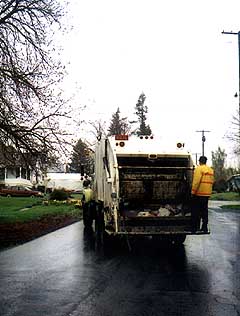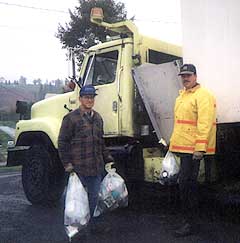
Surveys
DJC.COM
July 12, 2001
Tiny town recycles Goliath proportions
Whitman County Public Works

Photo courtesy of Whitman County Public Works Over a five-year period, the town of Garfield reduced the amount of solid waste sent to the local landfill from 452 tons to 409 tons. |

|
Imagine a small town in the heart of the Palouse region of Eastern Washington with a population of 580, the size of a large apartment complex or office building in Seattle.
This incorporated town has a comprehensive curbside recycling program, solid waste pick-up, used oil recycling, old appliance recycling, school recycling and yard trimmings management — all successfully maintained by only two town employees!
The town is Garfield, winner of four consecutive “Community Recycling Drop-Off” (CRDO) grants from Whitman County’s Solid Waste and Recycling Division, and now, winner of the “Recycler of the Year — Government/Institution” from the Washington State Recycling Association. The award was presented at the WSRA annual conference and awards banquet in Yakima on May 8.
Despite its small size and significant distance from local recycling facilities and regional recycling markets, this town has been dedicated to providing solid waste services since 1975, and curbside recycling services since 1990.
Garfield exemplifies a rural town in Washington with a unique, long-term commitment to recycling, waste reduction education, and to expanding its solid waste and recycling programs.
Winning the CRDO grants from Whitman County was no small task for this rural town, considering problems such as volatile recycling markets, transportation costs and other tough issues faced by many small towns — water/sewer improvements, street/town maintenance, sustaining rural schools and business turnover. The grants were awarded to Garfield because it demonstrated a commitment to implement and expand a long-term recycling and waste reduction program.
This commitment has furthered recycling and reduced the amount of solid waste going to a landfill by:
- Capturing 60 tons of recyclable materials in 2000; roughly 137 pounds recycled per person.
- Building a used-oil recycling drop-off next to the recycling center.
- Expanding its education program by using part of the grant money to implement K-12 recycling lessons and contests within the Garfield-Palouse Cooperative School.
- Keeping current recycling programs in tact while adding improvements to the recycling center, as well as plastics recycling at the school.
- Assisting town residents in collecting yard trimmings to recycle at the county transfer station.
- Reducing the amount of solid waste sent to a landfill from 452 tons in 1995 to 409 tons in 2000.
Garfield boasts a 50 percent participation rate due to aggressive, forward-thinking education programs implemented by the town council, mayor, town employees and the county. Residents that partake in recycling have come to realize the environmental importance of it and the beneficial savings that have resulted from lower waste disposal fees.
“The waste generated in the town is disposed of at a rate of $69 a ton,” said former Garfield Town Council member and current County Commissioner Greg Partch. “It is not necessarily important to us that we recycle only items that generate revenue because we save money by decreasing the amount of garbage going to a landfill. This translates into net savings in tipping fees for the town.”
The town has realized many important environmental benefits from its recycling program.
Students in the community are educated about making “waste into resources,” the school recycling program, conserving natural resources, buying recycled, and “America Recycles Day.”
Residents are informed about keeping used oil/hazardous wastes from being illegally dumped on rural roads and reducing the amount of recyclables that enter their waste stream.
Combined community support and consistent education from the town, school and businesses helps dispel the myth that “It doesn’t matter what we do with our garbage way out here, we’ll dump it or burn it like we’ve done for years.”
The rural habits of burning municipal solid waste or dumping it anywhere other than a permitted landfill are both illegal in Washington state.
The town of Garfield is the only incorporated entity in Whitman County that requires and provides solid waste and recycling services for its residents. Garfield is a leader in rural waste management because of the team of innovative public servants who have worked long and hard to develop and expand their recycling program while keeping it operational and affordable for their neighbors.
Amy Wallace is the recycling, waste reduction and moderate risk waste coordinator for Whitman County Public Works.
Other Stories:
- Pesticide-free parks teach new lessons
- Water metering: the debate trickles on
- Studies sniff out Tacoma smelter plume
- Tree investment brings cities many happy returns
- From wood preservation to site remediation — the Cascade Pole cleanup
- New rules for birds, bogs and bulldozers
- Isolated wetlands ruling creates confusion
- Environmental metamorphosis on the Duwamish
- Mitigation banks balance habitat, development
- New Pin Foundation minimizes site impacts
- Bringing a city stream back to life
- Knitting a trail of green
- Stormwater problems? Put a LID on it
- More brownfield incentives in the pipeline
- SEPA document trends since GMA and regulatory reform
- Construction faces new foe: toxic mold
- Helping environmental groups to get wired
- Frequently asked ESA questions
- Muddy waters: The new 4(d) salmon rule
- Global climate change starts at home
- At EPA, next 4 years won’t be boring
- Dams vs. fish? Mediate it!
- 'House calls' help firms to conserve
- Building a greener future on Bainbridge
- Power users, producers turn toward the sun
- Seattle goes climate neutral
- Bamboo’s popularity shoots up
- MTCA revisions take effect Aug. 15
- Environmental education: Knowing what’s in your backyard
- Bear Creek roars again
- Shedding light into the permit ‘black hole’
- UW Bothell — a wetland lesson in the making
Copyright ©2009 Seattle Daily Journal and DJC.COM.
Comments? Questions? Contact us.